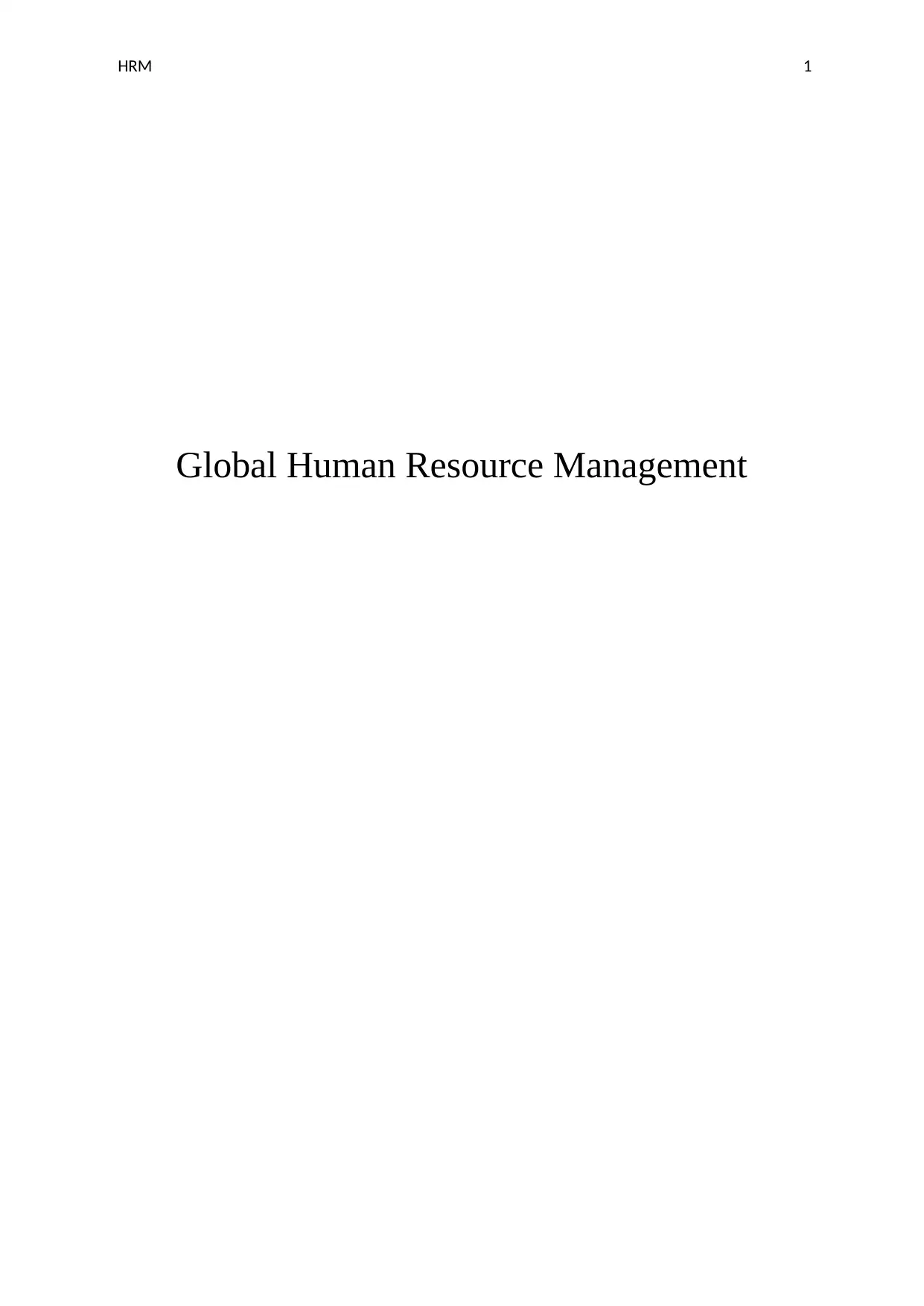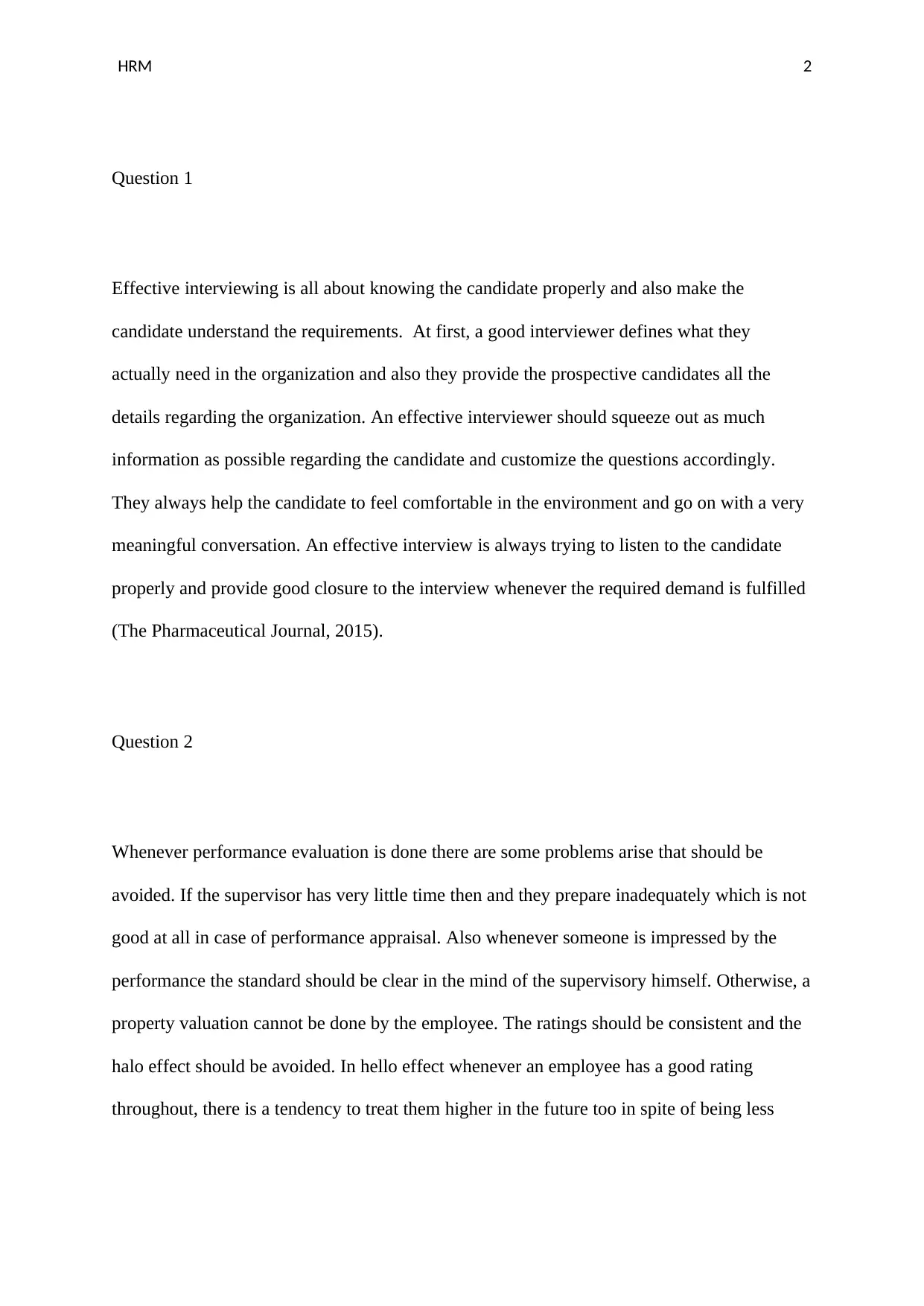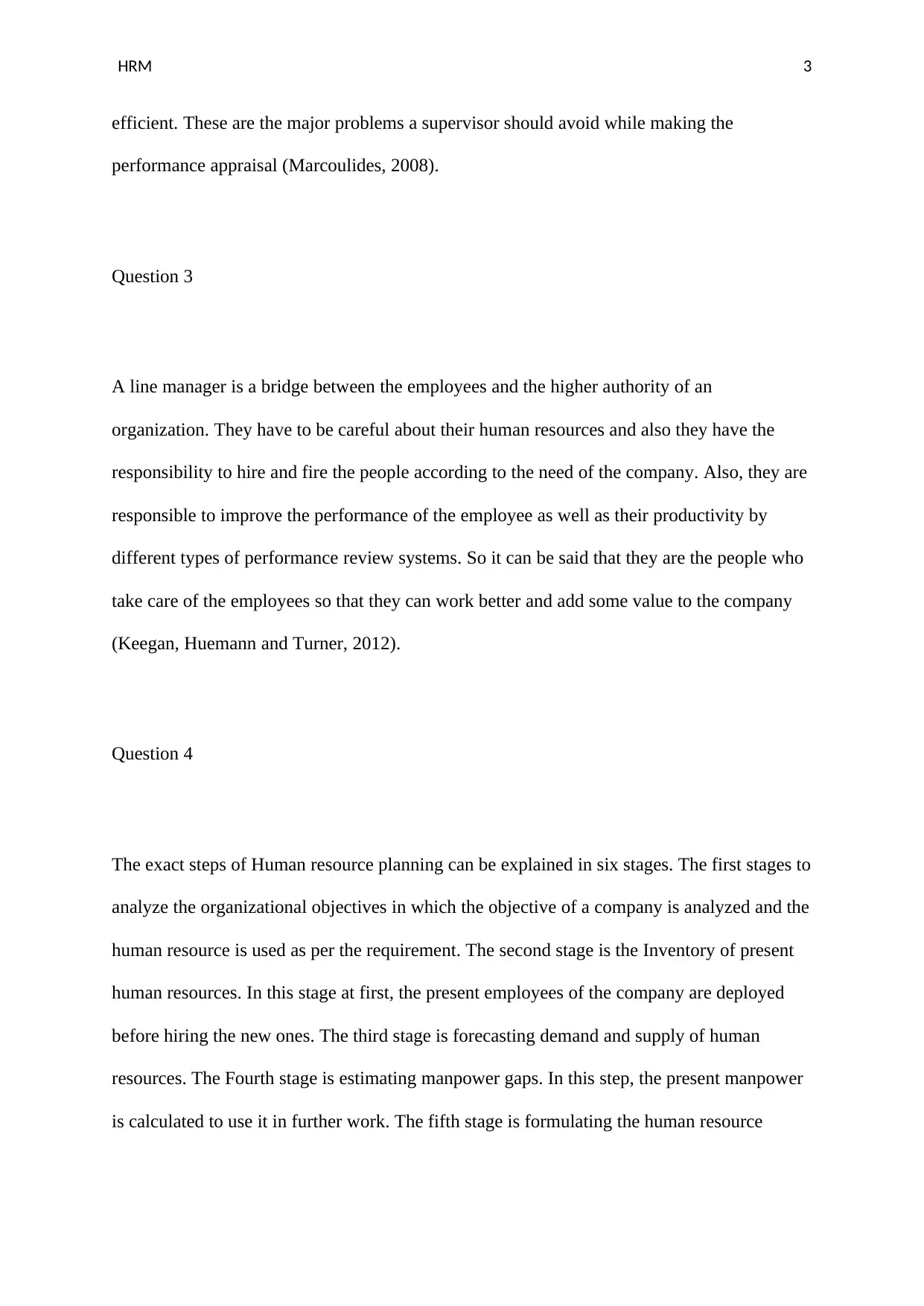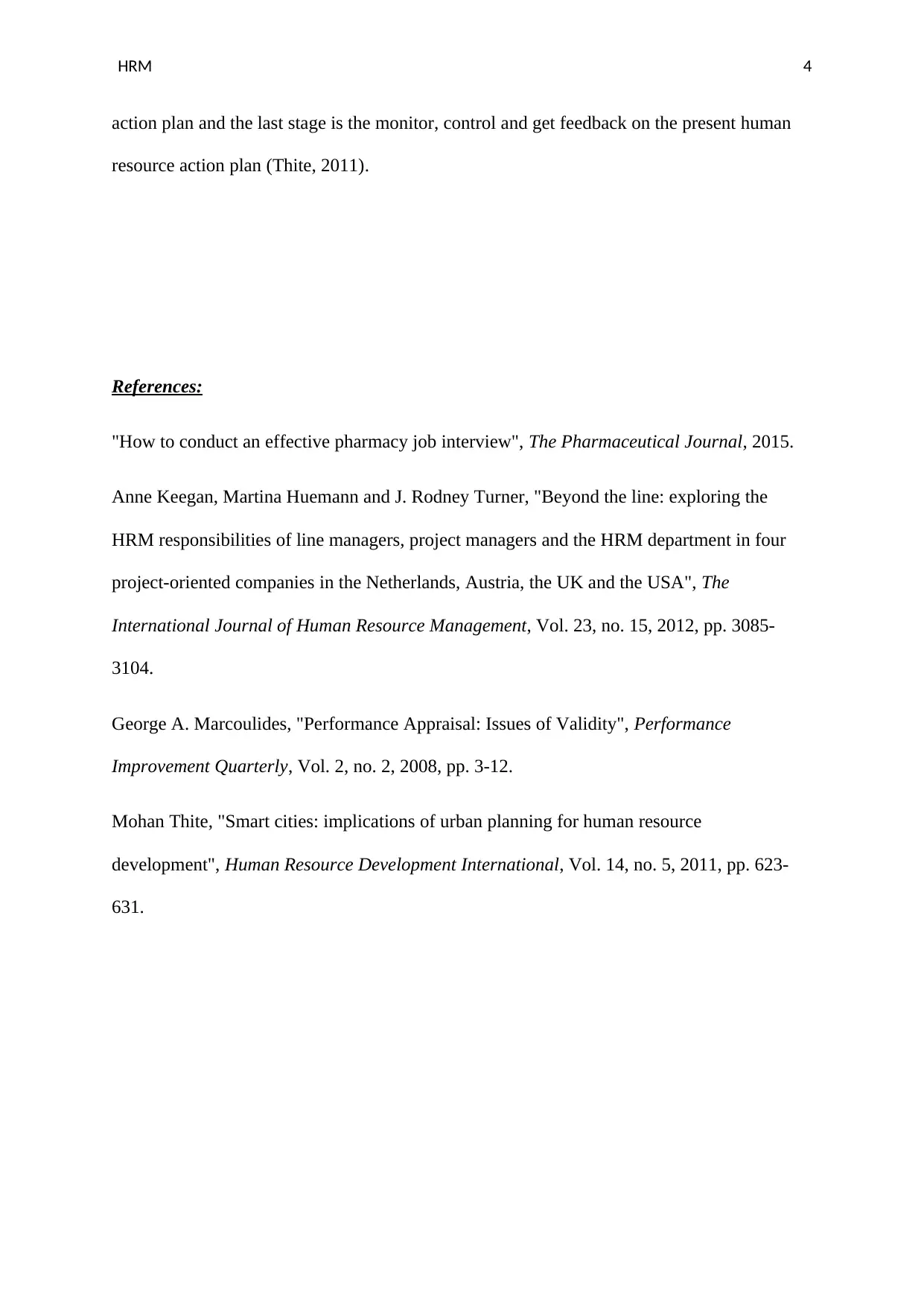HRM 4: Analysis of Interviewing, Performance, and HR Planning
VerifiedAdded on 2022/09/03
|4
|678
|20
Report
AI Summary
This report addresses key aspects of HRM 4, including effective interviewing techniques, where the importance of candidate comfort and thorough questioning is emphasized. It also discusses performance appraisal, highlighting common pitfalls like insufficient preparation and the halo effect. The role of a line manager is examined, focusing on their responsibilities in employee management and performance improvement. Furthermore, the report outlines the six stages of human resource planning, from analyzing organizational objectives to monitoring and controlling the HR action plan. The provided references support the concepts discussed, offering additional resources for further study.

HRM 1
Global Human Resource Management
Global Human Resource Management
Paraphrase This Document
Need a fresh take? Get an instant paraphrase of this document with our AI Paraphraser

HRM 2
Question 1
Effective interviewing is all about knowing the candidate properly and also make the
candidate understand the requirements. At first, a good interviewer defines what they
actually need in the organization and also they provide the prospective candidates all the
details regarding the organization. An effective interviewer should squeeze out as much
information as possible regarding the candidate and customize the questions accordingly.
They always help the candidate to feel comfortable in the environment and go on with a very
meaningful conversation. An effective interview is always trying to listen to the candidate
properly and provide good closure to the interview whenever the required demand is fulfilled
(The Pharmaceutical Journal, 2015).
Question 2
Whenever performance evaluation is done there are some problems arise that should be
avoided. If the supervisor has very little time then and they prepare inadequately which is not
good at all in case of performance appraisal. Also whenever someone is impressed by the
performance the standard should be clear in the mind of the supervisory himself. Otherwise, a
property valuation cannot be done by the employee. The ratings should be consistent and the
halo effect should be avoided. In hello effect whenever an employee has a good rating
throughout, there is a tendency to treat them higher in the future too in spite of being less
Question 1
Effective interviewing is all about knowing the candidate properly and also make the
candidate understand the requirements. At first, a good interviewer defines what they
actually need in the organization and also they provide the prospective candidates all the
details regarding the organization. An effective interviewer should squeeze out as much
information as possible regarding the candidate and customize the questions accordingly.
They always help the candidate to feel comfortable in the environment and go on with a very
meaningful conversation. An effective interview is always trying to listen to the candidate
properly and provide good closure to the interview whenever the required demand is fulfilled
(The Pharmaceutical Journal, 2015).
Question 2
Whenever performance evaluation is done there are some problems arise that should be
avoided. If the supervisor has very little time then and they prepare inadequately which is not
good at all in case of performance appraisal. Also whenever someone is impressed by the
performance the standard should be clear in the mind of the supervisory himself. Otherwise, a
property valuation cannot be done by the employee. The ratings should be consistent and the
halo effect should be avoided. In hello effect whenever an employee has a good rating
throughout, there is a tendency to treat them higher in the future too in spite of being less

HRM 3
efficient. These are the major problems a supervisor should avoid while making the
performance appraisal (Marcoulides, 2008).
Question 3
A line manager is a bridge between the employees and the higher authority of an
organization. They have to be careful about their human resources and also they have the
responsibility to hire and fire the people according to the need of the company. Also, they are
responsible to improve the performance of the employee as well as their productivity by
different types of performance review systems. So it can be said that they are the people who
take care of the employees so that they can work better and add some value to the company
(Keegan, Huemann and Turner, 2012).
Question 4
The exact steps of Human resource planning can be explained in six stages. The first stages to
analyze the organizational objectives in which the objective of a company is analyzed and the
human resource is used as per the requirement. The second stage is the Inventory of present
human resources. In this stage at first, the present employees of the company are deployed
before hiring the new ones. The third stage is forecasting demand and supply of human
resources. The Fourth stage is estimating manpower gaps. In this step, the present manpower
is calculated to use it in further work. The fifth stage is formulating the human resource
efficient. These are the major problems a supervisor should avoid while making the
performance appraisal (Marcoulides, 2008).
Question 3
A line manager is a bridge between the employees and the higher authority of an
organization. They have to be careful about their human resources and also they have the
responsibility to hire and fire the people according to the need of the company. Also, they are
responsible to improve the performance of the employee as well as their productivity by
different types of performance review systems. So it can be said that they are the people who
take care of the employees so that they can work better and add some value to the company
(Keegan, Huemann and Turner, 2012).
Question 4
The exact steps of Human resource planning can be explained in six stages. The first stages to
analyze the organizational objectives in which the objective of a company is analyzed and the
human resource is used as per the requirement. The second stage is the Inventory of present
human resources. In this stage at first, the present employees of the company are deployed
before hiring the new ones. The third stage is forecasting demand and supply of human
resources. The Fourth stage is estimating manpower gaps. In this step, the present manpower
is calculated to use it in further work. The fifth stage is formulating the human resource
⊘ This is a preview!⊘
Do you want full access?
Subscribe today to unlock all pages.

Trusted by 1+ million students worldwide

HRM 4
action plan and the last stage is the monitor, control and get feedback on the present human
resource action plan (Thite, 2011).
References:
"How to conduct an effective pharmacy job interview", The Pharmaceutical Journal, 2015.
Anne Keegan, Martina Huemann and J. Rodney Turner, "Beyond the line: exploring the
HRM responsibilities of line managers, project managers and the HRM department in four
project-oriented companies in the Netherlands, Austria, the UK and the USA", The
International Journal of Human Resource Management, Vol. 23, no. 15, 2012, pp. 3085-
3104.
George A. Marcoulides, "Performance Appraisal: Issues of Validity", Performance
Improvement Quarterly, Vol. 2, no. 2, 2008, pp. 3-12.
Mohan Thite, "Smart cities: implications of urban planning for human resource
development", Human Resource Development International, Vol. 14, no. 5, 2011, pp. 623-
631.
action plan and the last stage is the monitor, control and get feedback on the present human
resource action plan (Thite, 2011).
References:
"How to conduct an effective pharmacy job interview", The Pharmaceutical Journal, 2015.
Anne Keegan, Martina Huemann and J. Rodney Turner, "Beyond the line: exploring the
HRM responsibilities of line managers, project managers and the HRM department in four
project-oriented companies in the Netherlands, Austria, the UK and the USA", The
International Journal of Human Resource Management, Vol. 23, no. 15, 2012, pp. 3085-
3104.
George A. Marcoulides, "Performance Appraisal: Issues of Validity", Performance
Improvement Quarterly, Vol. 2, no. 2, 2008, pp. 3-12.
Mohan Thite, "Smart cities: implications of urban planning for human resource
development", Human Resource Development International, Vol. 14, no. 5, 2011, pp. 623-
631.
1 out of 4
Related Documents
Your All-in-One AI-Powered Toolkit for Academic Success.
+13062052269
info@desklib.com
Available 24*7 on WhatsApp / Email
![[object Object]](/_next/static/media/star-bottom.7253800d.svg)
Unlock your academic potential
Copyright © 2020–2025 A2Z Services. All Rights Reserved. Developed and managed by ZUCOL.



